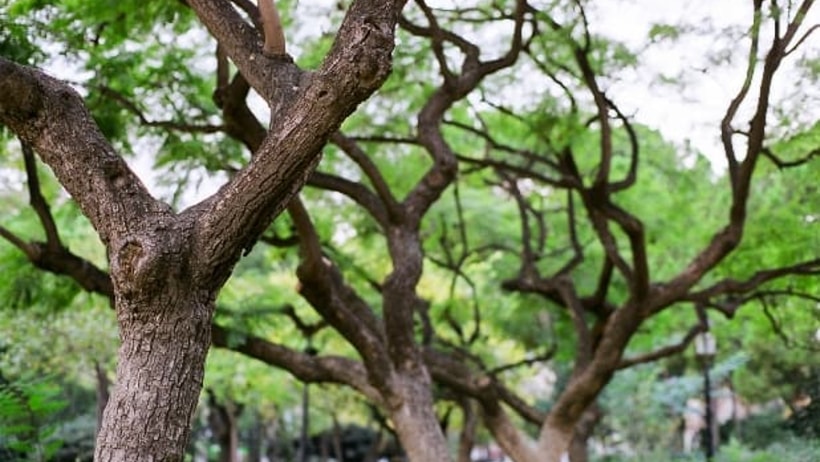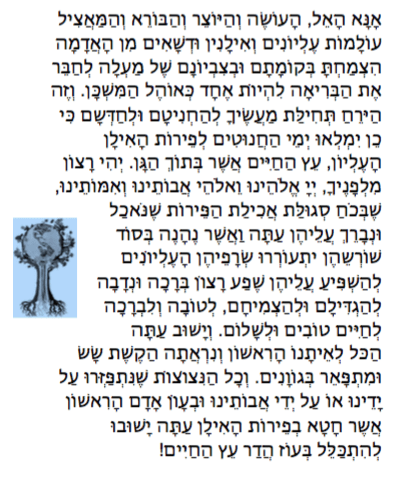Oasis Songs: Musings from Rav D
Friday, January 26, 2018 / 10th Shevat 5778
Summary: Rabbi Kosak teaches about the upcoming holiday of Tu B’shvat, often called “the birthday of the trees.” He provides some historical context, translates a rare mystical prayer, and provides a link to a wonderful “haggadah” for those who would like to invite friends over for an ecological seder meal.
O Tree, O Tree, How Should I Bless You
Beginning Tuesday night, and continuing till dusk on Wednesday, Jews around the world will be observing Tu B’shevat. Tu B’shvat simply means the 15th day of the Hebrew month, Shevat. Yet there is nothing simple about how we observe this day.
In its earliest iteration, as recorded in the Talmud, this was tree tax day. Tree tax day? Yes. When most human wealth flowed out of our agricultural endeavors, our ancestors understood that they had to share the bounty quite literally. The Torah itself commands us about the need to tithe our harvested wealth, but does not always specify the mechanism for doing so. The implementation of these Biblical laws depends on our ancient oral tradition, as recorded in the Mishnah and Talmud.

Some of those tithes supported religious and civic institutions. Others were directed to the poor (ma’aser ani), which is why Tu B’shvat is so important. Any fruit tree that bloomed after the 15th of Shevat would be periodically subject to this tax meant to alleviate poverty and hunger. In most cases, the tithes were not converted to currency, but the fruit itself had to be brought and donated.
Fast forward to the modern era, and two trends occur. In the Diaspora, Tu B’shvat becomes the pre-eminent ecological holiday. In Israel, this ecological element is also heightened with a sense of being reunited with our ancient homeland. It is no accident that the K’nesset’s precursor, the Constituent Assembly, convened its first meeting on Tu B’Shvat in the year 5709 (1949).
In between the age of tithing and the modern era with its focus on ecology, the kabbalistic era of the Middle Ages mined Tu B’shvat for spiritual gleanings.
It was here that the Tu B’shvat seder was born. This highly spiritualized meal featured courses in which different tree fruits were eaten, each representing another mystical level of being. While the Tu B’shvat seder has gained popularity in recent years, especially among teachers of young children, its deeper meanings have paled. That is unfortunate, because it provides us with an extremely profound model of spiritual ecology that our modern age could benefit from.
Given that trend, I want to give you a couple of gifts for the holiday. The first is a meditation from the very first printed Tu B’shvat haggadah. This is a 16th or 17th century book called “Pri Etz Hadar,” or “Fruit of the Beautiful Tree.” Before it was printed, only a small group of esoteric students held a seder for the trees. I have included the original Hebrew and my English translation. The prayer connects our human action of eating with sustenance for all trees so that they in turn can support human life. Feel free to use it to mark the holiday this year.
The second gift are two links: one is to a wonderful ecological haggadah. It is geared for college age students and above and can guide you if you’d like to hold an adult Tu B’shvat seder. The other is for a family-oriented seder.
As the rains continue to fall upon Portland, may they be a source of blessing. May our trees, those which provide fruit and those which generate clean air, prosper from these wet days as they prepare to rouse themselves from their winter slumbers.
Warmth and blessings,
Rav D
Link to WZO’s Tu B’Shvat Haggadah for Adults
A Kavannah (Intention) for Tu B’Shvat
Shabbat Table Talk
This week, please consider looking at one of the two Tu B’shvat Haggadah links. In each, you will find some worthwhile questions to enrich your Shabbat discussion or the holiday
If you’d like to continue this discussion, follow this link to CNS’s Facebook page to share your own perspectives on the topics raised in this week’s Oasis Songs. Comments will be moderated as necessary.




